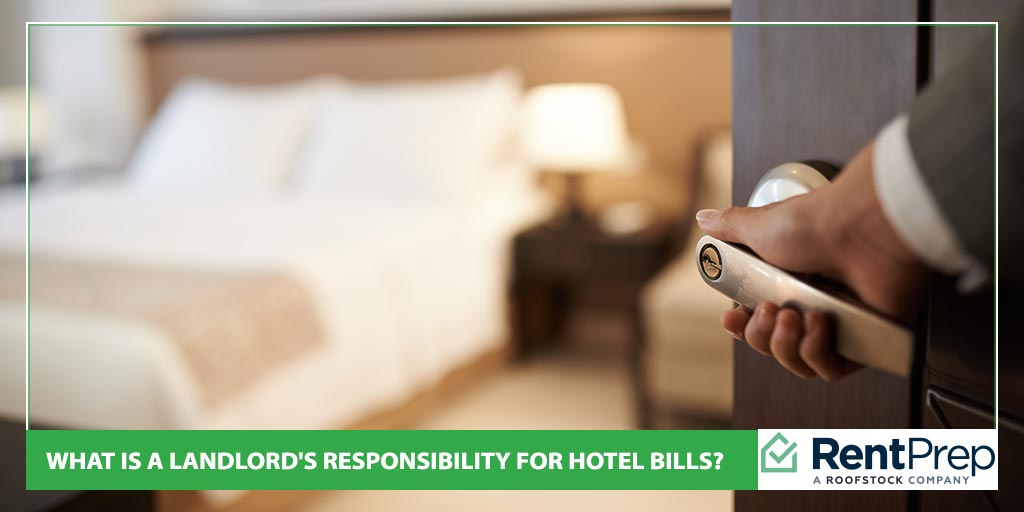
Landlords are responsible for ensuring that a rental property is habitable. A habitable unit is structurally sound and has adequate water, heating and electricity.
Sometimes, circumstances arise that make the rental unit uninhabitable for a time. Usually this is due to serious repairs, natural disasters or other significant problems. During these times, tenants often stay at a hotel until the work is done.
When this happens, what is a landlord’s responsibility for hotel bills?
When Would Tenants Acquire Hotel Bills?
In the event of a fire, leaky pipe or other unplanned emergency that makes a place uninhabitable, tenants have to move out for a while. Most stay in a hotel until the damaged unit is repaired.
Some tenants want their landlord to reimburse them for the cost of the hotel. They often mistakenly assume that the landlord’s insurance policy will cover their relocation costs. Or they assume that because the unit is not habitable they automatically get put up into a hotel of their choice and the landlord foots the bill. These assumptions often lead to conflict.
The truth is that landlord’s homeowner insurance will not cover costs associated with tenant relocation. Nor will it cover a tenant’s damaged belongings. However, most renter’s insurance policies will cover both for the tenant. That’s why many landlords insist that their tenants carry an active renter’s insurance policy.
In most states, tenants can break a lease agreement without penalty if the rental property becomes uninhabitable due to no fault of the tenant. If the tenant is at fault, other laws come into play.
Unfortunately, this situation is not often outlined in a lease agreement. Landlords and tenants often don’t discuss hotel bills and relocation until something big happens.
When is it a Landlord’s Responsibility for Hotel Bills?

Landlords are usually not bound to cover the hotel bill for a displaced tenant when the events are out of their control. They can reinforce this in several ways. The most common way is to include a clause in the lease agreement. The clause should state what happens in the event the unit is uninhabitable due to unplanned circumstances.
If the unit is uninhabitable for just a few days, landlords should prorate the rent for the number of days it could not be occupied. The tenants would be responsible for their own lodgings in the meantime. If the problem arose out of something the landlord did or didn’t do, then the tenants could petition for hotel reimbursement directly or through small claims court.
When the unit is uninhabitable for an indeterminate amount of time, many states require that the landlord release the tenants from the lease agreement and prorate any rent already paid. Plus, the tenants must receive their deposit back. There is generally no landlord’s responsibility for hotel bills.
Sometimes landlords schedule things like fumigation or a fast remodel that require the tenants to vacate for a short period of time. In these instances, landlords often cover reasonable hotel costs for good tenants for a few days. They may feel it is worth it to them to keep the tenants and accommodate them. In other cases, they prorate the rent only for days that the unit was inhabitable. This is completely up to the landlord, however.
RentPrep’s Take On a Landlord’s Responsibility for Hotel Bills
Here at RentPrep, we feel that landlords across the country should include a clause in the lease agreement that requires tenants to carry renter’s insurance. It’s the easiest way to deal with relocation in case of emergencies in addition to liability and reimbursement for any damaged or destroyed property.
Landlords should also include a clause about what happens if the unit is not habitable. It’s a good idea to put reasonable time limits on repairs, fumigation and remodels. For example, the lease could say that if the property becomes uninhabitable for more than 5 days, then both parties bear no more commitment to the agreement without penalty.
It’s important for landlords to be fair about prorating rent. After all, if a tenant can’t live in a unit they have paid rent on, they should be compensated. However, that compensation should usually not extend to paying for hotels, especially when an affordable renter’s insurance policy will do so.
What Are Other Landlords Saying About the Responsibility for Hotel Bills?
Every landlord needs to comply with local and state laws regarding uninhabitable properties. There’s always peace of mind in consulting with a landlord/tenant attorney as well.
Here’s a screenshot of landlords discussing this question in our private Facebook group for Landlords.
 You can see even more comments on that post by checking it out in the group.
You can see even more comments on that post by checking it out in the group.

